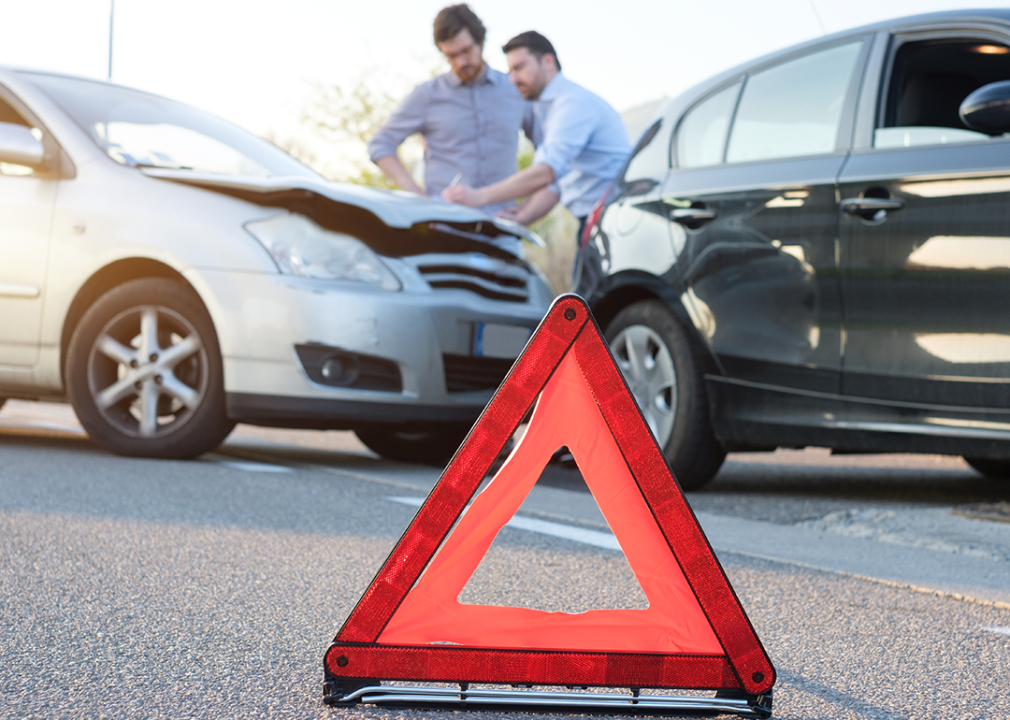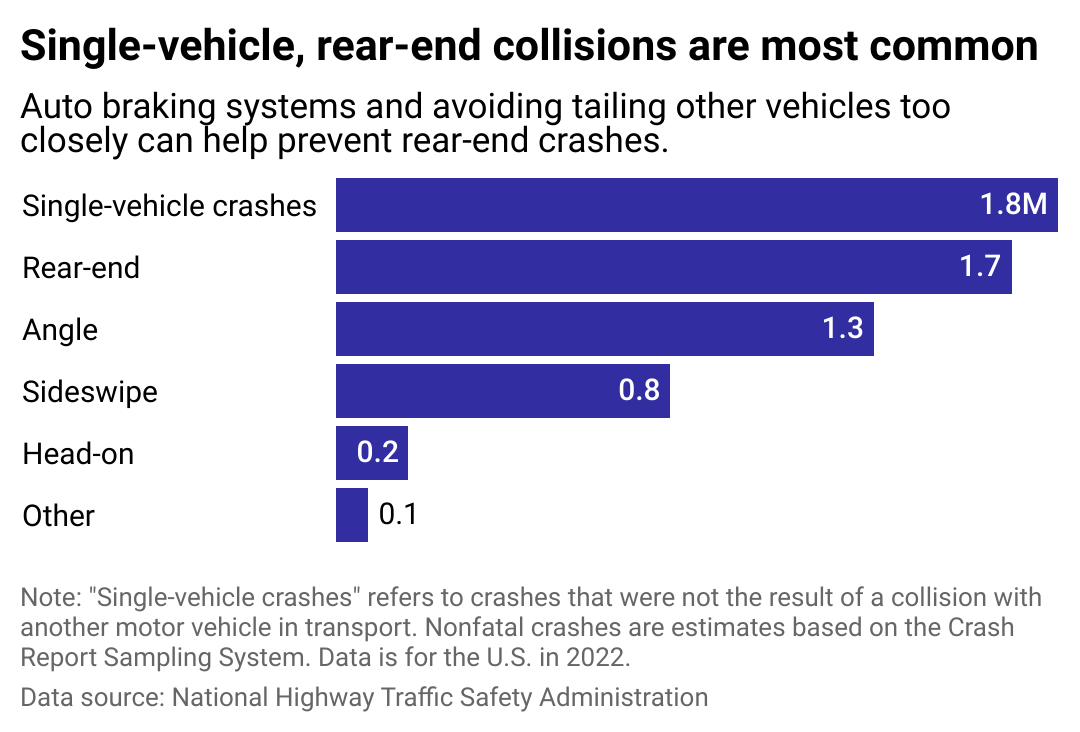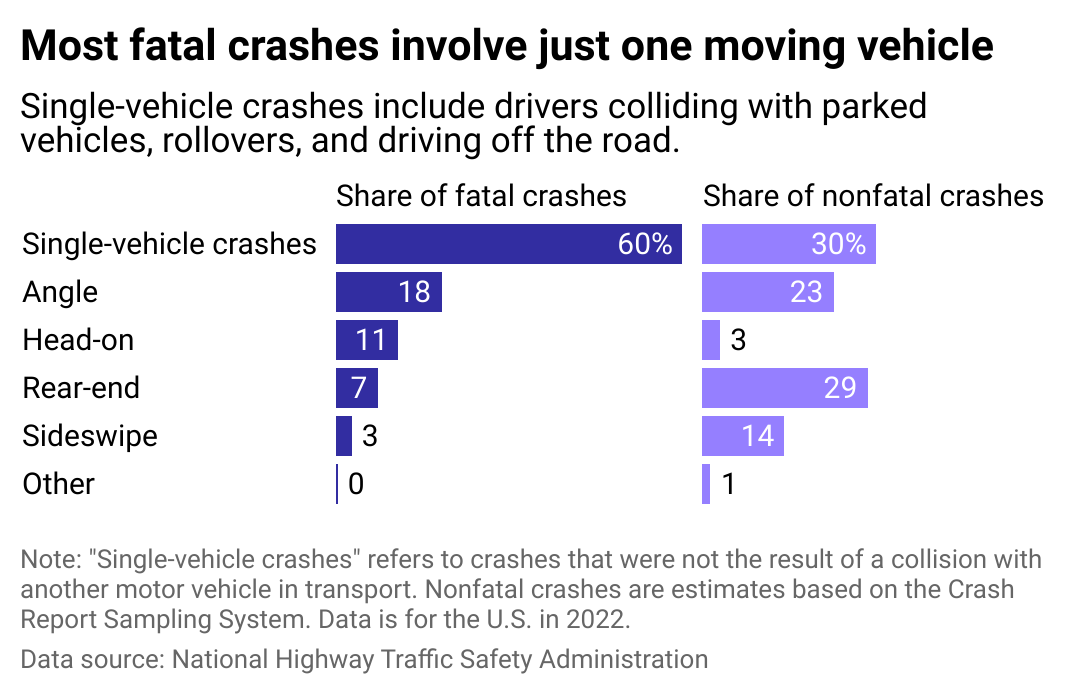The most common types of car crashes in America

F01 PHOTO // Shutterstock
The most common types of car crashes in America
Two men standing by car crash with red emergency triangle on road.
Screech. Boom. Crash! In today’s fast-paced world, car crashes feel like simply a fact of life. In 1913, before cars dominated the roads, there were only 1.3 million vehicles registered and 4,200 deaths associated with them, according to the National Safety Council. Fast-forward more than a century to 2022, when the latest data is available, and registered vehicles have soared to 283 million, with 46,027 people dying and 5.2 million getting injured on the road.
The General analyzed National Highway Traffic Safety Administration data to determine the most common types of car crashes in the United States.
According to the NHTSA, there were nearly 6 million car crashes reported in the United States based on its most recent data from 2022. The NHTSA’s annual Crash Report Sampling System analyzes police-reported vehicle accidents from across the country and breaks them down into categories based on the type of collision and whether the collision resulted in property damage, injury, or death.
Fortunately, the incidence of fatal crashes per 100,000 people dropped 2% between 2021 and 2022, but that decrease comes on the heels of a sharp 11% increase from 2020 to 2021 when motorists returned to the road after COVID-19. These traffic accidents cost the economy about $340 billion in lost productivity, medical, and legal costs over this period.
States have made some progress in combatting crashes by aggressively enforcing traffic laws under programs such as Click It or Ticket (which encourages wearing seat belts) and installing improved road markings and signage. Automakers have also done their part by incorporating technology along the lines of collision detection and blind-spot monitoring into vehicles. Despite these advances, driving is still one of the most dangerous activities Americans perform on a daily basis.
![]()

The General
The most common collisions
A bar chart showing the number of car crashes by type, including single-vehicle crashes, as well as rear-end, head-on, angle, sideswipe, and other collisions.
Most people likely consider car crashes the product of two or more vehicles in motion colliding. However, NHTSA data showed that single-vehicle crashes were the most common type of collisions, accounting for approximately 1.8 million reported cases. These involve a single vehicle in motion colliding with pedestrians, animals in the roadways, or stationary objects, including parked or immobile vehicles. They also include crashes where a single vehicle mistakenly veers off the road or rolls over.
The second most common collisions were rear-end crashes, wherein one vehicle strikes another from behind, accounting for almost 1.7 million reported accidents. They often occur when the vehicles involved are slowing down, such as when approaching traffic lights, stop signs, or heavy traffic.
Angled collisions were slightly less common, accounting for approximately 1.3 million crashes. These crashes occur when one vehicle’s front strikes another’s side at or near a right angle and are often informally referred to as T-bone collisions. Sideswipes, where the sides of two vehicles strike each other, accounted for fewer collisions, while head-on collisions were among the least common.
Accidents of all kinds can be prevented by practicing regular driving safety: maintaining proper speed, allowing ample distance between you and the car ahead, and taking road and weather conditions into account. Even if no other vehicles are on the road, drivers must still keep an eye out for animals and pedestrians, along with objects that might present collision hazards.
Backup cameras, collision detection, and other advanced safety technologies are becoming standards on many modern vehicles and can also assist in avoiding collisions. Lastly, drivers must minimize distractions such as using smartphones or even eating a quick to-go meal while behind the wheel.

The General
A vast majority of fatal crashes involve a single driver
A split bar chart showing the share of fatal and non-fatal car crashes of each collision type. 60% of fatal crashes were single-driver crashes, while non-fatal crashes were more evenly split among single-vehicle, rear-end, and angle collisions.
Traffic crashes accounted for 42,514 deaths in 2022, a mortality rate of 12.8 per 100,000 people, according to the Federal Highway Administration. This number was 716 deaths lower than the previous year, but it is still high compared to the 39,007 deaths in 2020 and the 36,355 deaths in 2019.
Apart from being the most common type of crash, single-vehicle accidents were the most fatal, accounting for 3 out of every 5 deaths. This is a stark contrast to rear-end collisions, which almost matched single-vehicle crashes in overall number but only accounted for 7% of fatal incidents. Between vehicles in motion, angled collisions accounted for 18% of all fatal crashes. Head-on collisions were low in number but highly lethal, accounting for 11% of fatal crashes.
A good portion of these crashes occurred in the evenings, especially on the weekends, according to the National Safety Council’s analysis of NHTSA’s data. These times are often when there may be fewer vehicles on the road but sudden changes in the roadway and hazards are less visible. These are also the times when drivers are most susceptible to exhaustion, drugs or alcohol, distraction, and colliding with unseen objects.
Since 2020, there has also been an increased number of crashes involving large trucks, with the majority of fatalities being occupants in other vehicles besides the trucks. These fatal collisions can occur even when the truck is parked. Regulations in the trucking industry limit the number of hours truck drivers can operate their vehicle, but face a shortage of overnight parking venues. As a result, more truck drivers are pulling off onto road and highway shoulders for rest periods and sleep. Unfortunately, these dark hours are when large trucks parked on the side of the road present the greatest hazard to other drivers.
Caution and due regard are the best preventative measures drivers can exercise to stay safe on the roads and avoid all kinds of crashes. As Georgia’s Department of Transportation says, “Drive alert. Arrive alive.”
Story editing by Carren Jao. Additional editing by Kelly Glass. Copy editing by Tim Bruns.
This story originally appeared on The General and was produced and
distributed in partnership with Stacker Studio.